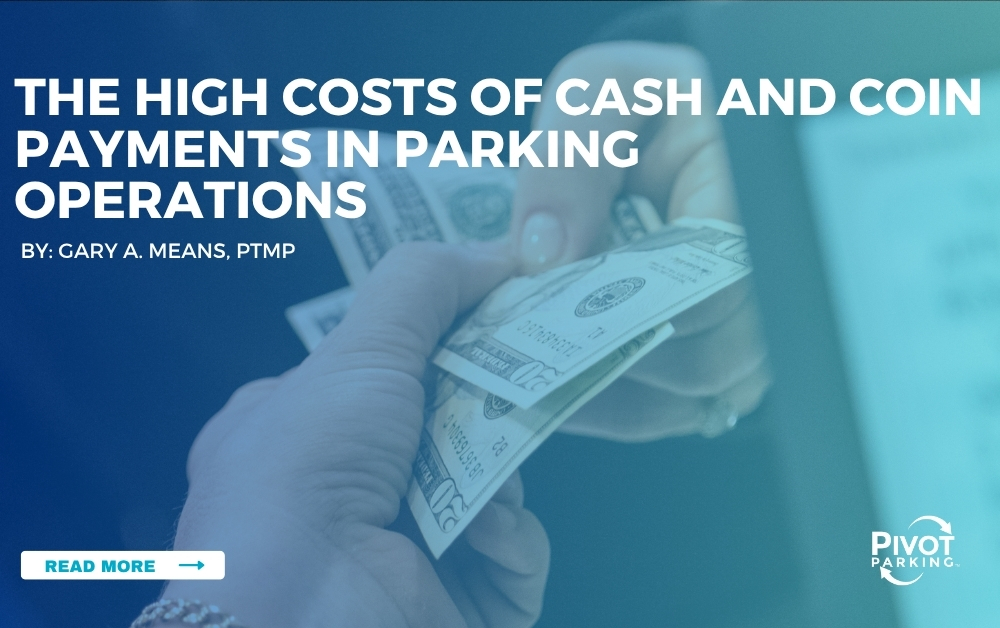For decades, cash and coin payments were the backbone of parking. Single-space meters, pay-on-foot kiosks, and gate-controlled facilities all relied on quarters, dollar bills, and frequent trips to the bank. Today, however, those “familiar” methods come with hidden expenses that strain budgets, frustrate customers, and expose operators to unnecessary risks. This post explores why continuing to accept coins and cash in parking operations is increasingly costly and why digital and contactless parking payments are rapidly becoming the smarter solution.
Let’s first look at the operational costs of accepting cash and coins.
Coin handling and sorting are labor-intensive. Staff must regularly collect and count coins, and even with automated sorters, purchase and maintenance costs remain high.
Frequent deposits add to the burden. Large volumes of coins require regular trips to the bank, driving up labor costs and creating theft risks. Secure transport only increases the expense.
Maintenance and equipment costs are another factor. Coin-operated meters and kiosks wear down faster, often jamming or malfunctioning. Repairs and upgrades are costly, and outdated equipment quickly becomes a drain on budgets.
From the customer side, paying with cash and coins is inconvenient. Many don’t carry change, and longer wait times at meters or kiosks create frustration. Digital options like credit cards or mobile payments are faster, easier, and more accessible, boosting both satisfaction and revenue.
Security risks also weigh heavily. Physical money attracts theft and vandalism, while counterfeit bills and coins, though less common, still require extra safeguards.
Finally, there’s the environmental impact. Producing, transporting, and handling coins leaves a sizable carbon footprint. Digital payments not only reduce costs but also support broader sustainability goals.
The True Cost of Handling Coins
Managing coins is far from simple. Staff must collect, sort, and count them daily, which consumes hours of labor. Even when automated sorters are used, purchase and maintenance costs can climb into the thousands. On top of that, heavy canisters need secure transport to banks or counting facilities. Many operators rely on armored car services that can cost $1,000 to $2,500 per week for scheduled pickups. These recurring expenses add up quickly and reduce profit margins.
Coin-operated machines also create ongoing maintenance headaches. They jam, wear down faster than digital systems, and eventually require expensive replacements as technology advances. What looks like a low-tech, low-cost payment option often becomes one of the highest long-term expenses in a parking program.
Costs of Equipment Needed to Support Cash and Coin Acceptance
Meter collection canisters, used to transport coins from meters, vary in cost based on size, material, and manufacturer. Heavy-duty versions for high-traffic areas run $300–$600, while custom or specialized canisters with features like RFID tracking or enhanced security can reach $1,000 or more. Additional costs often come from high-security locks, tamper-evident designs, and shipping.
Coin sorters also span a wide range. Mid-range models cost $500–$1,500 and handle larger volumes with features like automatic bagging and error detection. High-use parking models fall between $1,500–$5,000, while commercial-grade machines, designed for bulk processing, can reach $20,000. Beyond purchase, operators face maintenance and integration costs, with high-end machines often requiring professional servicing.
Once coins are counted and bundled, secure transport adds another expense. Armored car services range from $150–$300 per hour for basic service, while scheduled weekly pickups typically cost $1,000–$2,500. Specialized, high-security options can reach $5,000 per week, with extra fees for mileage, insurance, or added personnel. Operators must weigh volume, frequency, and security needs carefully before committing.
Health and Safety Risks of Cash Handling in Parking Operations
Handling coins brings safety risks. Lifting heavy canisters can lead to back strain, herniated discs, and repetitive stress injuries. Slips and falls are common when moving canisters in busy areas, and fatigue or poor ergonomics increase the risk of accidents. Training, mechanical aids like carts or lifts, PPE, and regular health monitoring are essential to protect staff.
Sanitation Risks of Cash and Coins in Parking Operations
Coins are handled by countless people and often carry dirt, bacteria, and viruses. Without proper hygiene, cross-contamination can occur, spreading germs to surfaces, equipment, or even food. Frequent handling during collection and sorting heightens the risk, making strict sanitation routines and protective equipment critical for safe operations.
This is just the beginning. In Part 2 of The Hidden Costs of Accepting Cash and Coin Payments in Parking Operations, we’ll explore practical strategies for reducing these risks and making the transition to digital payments.
